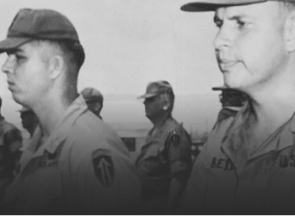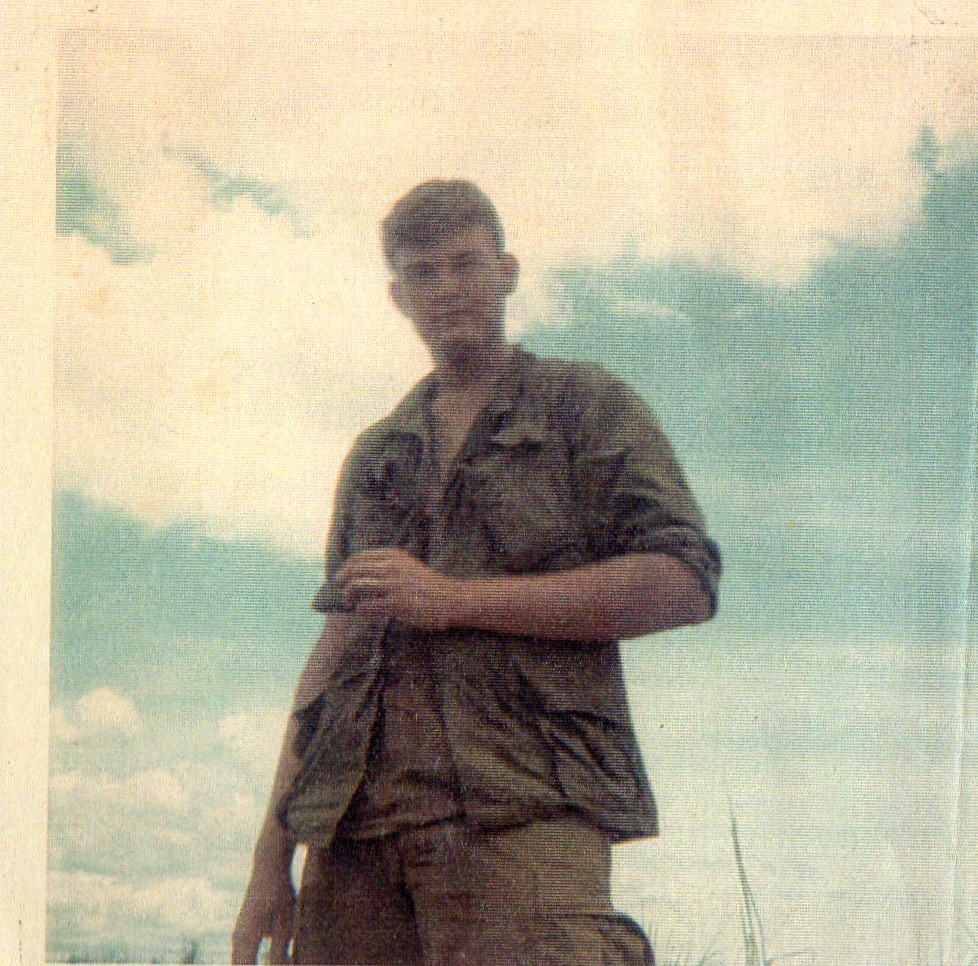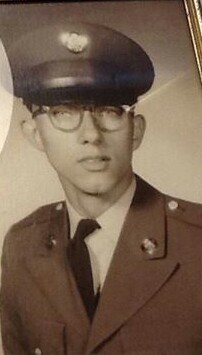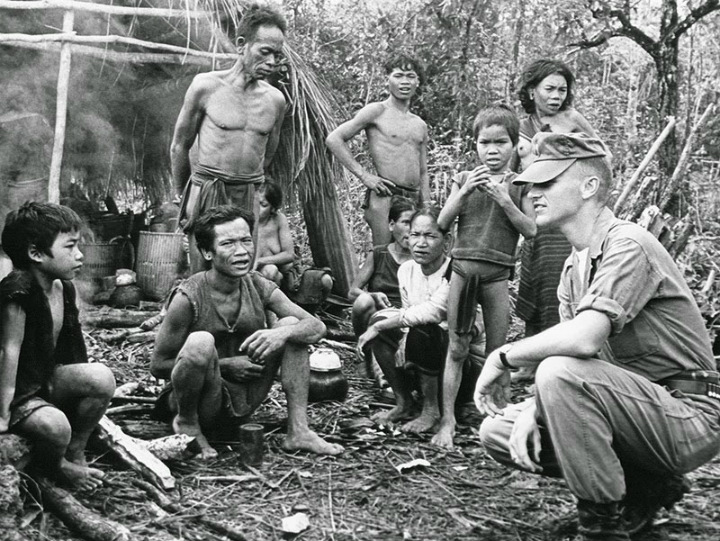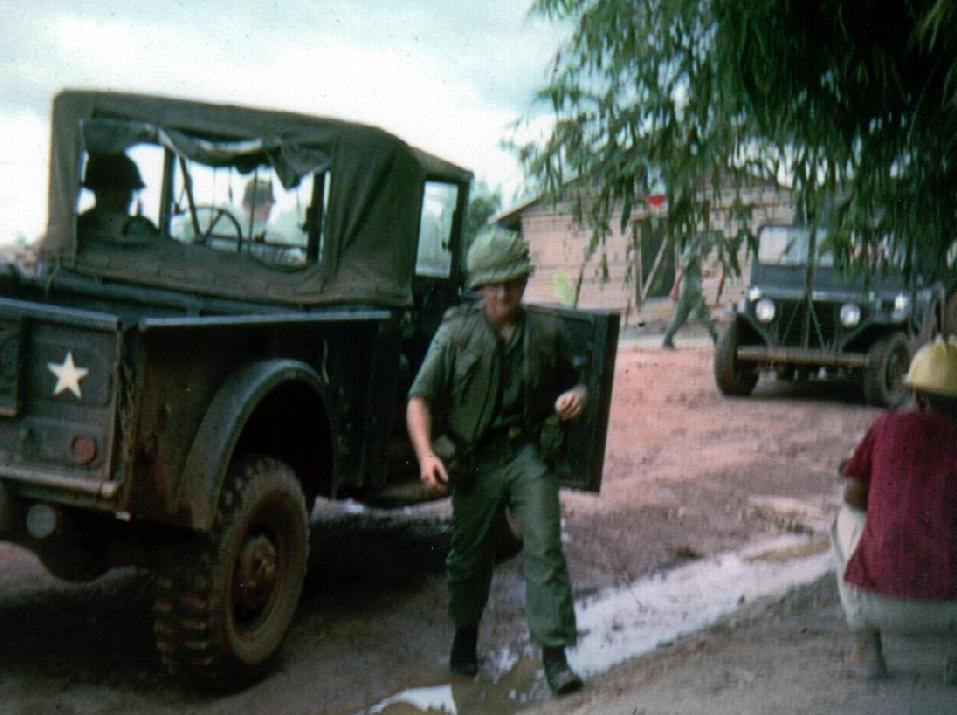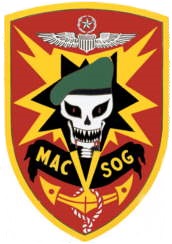Medevac To Qui Nhon Hospital "Malaria"
It was good to be back on the firebase, but of course, that didn’t change the weather. At least we had some temporary protection from the rain inside of the big tents. It was a welcome change to sleep on a cot, up off of the wet ground, and it felt nice to change into dry clothes before going back out on guard duty or ambush patrols. I believe they brought us back in from the field early because of the horrible monsoon weather.

Even the dogs had a hard time finding a dry spot!
It was miserable, but not only that, a lot of guys were becoming ill, mostly from minor colds or sore throats. Doc would pass out little bottles of Coricidin to anyone that felt like they needed one to relieve their symptoms. We called all of the medics “Doc,” even though they weren’t real doctors. I think our company had at least two medics. One of them from another platoon was said to be a conscientious objector, and I guess that must have been true because he never carried a weapon. He always had a big walking stick in hand wherever we went. I couldn’t understand why anyone would go out into the jungle unarmed. However, the medic in my platoon always carried an M-16 rifle, just like the rest of us did.
For some reason, one afternoon while out on patrol, I began feeling nauseated, maybe from one too many cans of bad c-rations. But then, on top of that, the next day, I developed a fever. I remained inside of the tent lying on my cot and covered up with my poncho liner most of that day. I told Doc that I was very sick, and he said: “Let’s wait till tomorrow, and we’ll see how you feel then.” The next day I felt better, but then the following day, the fever returned. Once again, Doc said to wait till tomorrow. It was the strangest thing; The fever and chills would return every other day, and then I’d feel much better on the alternate days. The pattern continued, so Doc decided that since he had a medevac chopper coming in for another guy who was also sick, he would send us both to the hospital at the same time. But Doc wasn’t happy about it since he had been getting flak from the C.O. for pulling too many guys out of duty, and we were already shorthanded.

Medevac chopper to Qui Nhon hospital
The medevac chopper flew us to Qui Nhon hospital, where they placed me in a big ward filled with guys who had similar symptoms. They sent the other sick guy who flew in with me to a hospital in Japan. I wondered why I couldn’t be that lucky and get a trip out of the country. But then who knows what that guy was stricken with; it must have been something more serious.
I guess I wasn’t feeling too sick that day because the first thing I noticed when arriving at the hospital ward was the female nurses. It never crossed my mind that women also served in Vietnam. I was surprised but pleased to see that the nurses were American women! And in my opinion, they were undeniably beautiful compared to the Vietnamese women. Just seeing their smiling round eyes made me feel better, but at the same time, I was suddenly homesick.
While in the hospital, I began developing some pretty severe headaches, along with a more severe fever. The nurses were frequently drawing blood for testing. I had no idea what was wrong, but I knew I was very sick. Eventually, a Dr. came around and told me that I had a right to feel as ill as I did. There were two types of malaria in Vietnam, and I had them both at the same time! They drew blood and took vitals four times a day and gave me a lot of pills to swallow. My arms started to look like the arms of a junkie drug addict with all of the needle prick marks. The first week continued to alternate between good days and bad days.
One day I would have a temperature of 102 and a near-normal temperature the next day. But soon, all of the days were bad, and I could tell that the bad days were getting worse. I felt like I was getting weaker and weaker. I guess I had been somewhat delirious from the high fever and never even realized it. I tried reading a book but wasn’t able to comprehend the words, so instead, I decided to write letters home, but I wasn’t able to think clearly. I couldn’t even complete a coherent written sentence. So, I gave up and tried to sleep. The nurse was making her usual rounds, checking on the patients, walking from bed to bed, passing out thermometers. When she returned to check mine, she suddenly ripped the bedsheets off of me and quickly led me to the showers. She said that my temperature was over 106 and ordered me to stand under the cold shower water. The nurse told me to stay in there for a while because if the fever didn’t come down, I would be packed in ice next. I knew from seeing some of the “packed in Ice” guys on the ward that I didn’t want to do that. They looked like they were dead. I guess she could see that I was weak and shaky and not thinking clearly, so her final instructions were: “Be careful, don’t slip and fall in there… and when you come out, stay away from the urinals that are marked for hepatitis only.” Luckily the cold shower worked; my temperature came back down, so I avoided the ice. The chills and fever continued for a couple more days until the medicines began working. I started feeling better and having some good days. The nurse told me that after I had three consecutive days without a fever that I could go home. She must have seen the quizzical look on my face and laughed. Home meant back to the home base.
I don’t remember how long I remained in the hospital, but after a week or so, I was released and told to return to my unit. I asked how I was going to get back to the base. Were they sending a jeep or a truck or what? They told me that the best thing to do was to hang around by the chopper pads and try to catch a ride on one of the helicopters. I couldn’t believe that. I was on my own, fresh out of the hospital ward, and they were telling me to hitchhike! I wasn’t even sure where my company was, but I figured they might be back at Tuy Hoa by now. But if not, I thought they should be back soon. So, I hitched a chopper ride to Tuy Hoa with orders in hand for light duty only, and no night duty for at least two weeks until a base Dr. released me. That meant no guard duty or ambush patrols for two more weeks. On a follow-up visit with a doctor on base, he told me that there was no cure for malaria. It goes dormant and will remain in my system for the rest of my life. However, I was lucky because I never had a recurrence of the illness symptoms. Later I read that in many of the wars, malaria took out more soldiers than bullets did.

Hitch hiked chopper ride landing back at Tuy Hoa
The kindle eBook is now available on Amazon: https://www.amazon.com/dp/B09FVW89HN
More chapters and photos are available on the Authors website: https://rucksackgrunt.com/






